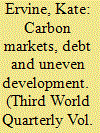|
|
|
Sort Order |
|
|
|
Items / Page
|
|
|
|
|
|
|
| Srl | Item |
| 1 |
ID:
121781


|
|
|
|
|
| Publication |
2013.
|
| Summary/Abstract |
The United Nations Clean Development Mechanism (cdm) has been envisaged as a powerful tool for reconciling the global South's environment and development problematic. By allowing Southern states to produce and sell carbon credits into the Kyoto Protocol's compliance market, many predicted a growing North-South transfer of carbon finance, technology and profit. Confronted by deep crisis in global carbon markets, however, the cdm, rather than spurring development, is furnishing the conditions for rising debt and insecurity since project costs must be financed upfront, with the expectation that future project revenue will subsequently fulfil these obligations. This paper analyses the dialectic entanglements between the cdm's ex post and market-dependent financing structure, the carbon market crisis and uneven development, based on the contention that cdm-related debt reveals the deeply unequal power relations that underpin contemporary approaches to climate change mitigation, whereby the North's ecological debt is displaced, both materially and financially, onto Southern actors.
|
|
|
|
|
|
|
|
|
|
|
|
|
|
|
|
| 2 |
ID:
098757


|
|
|
|
|
| Publication |
2010.
|
| Summary/Abstract |
This article examines the implementation of the Global Environment Facility's (GEF) Mexico-Mesoamerican Biological Corridor in Chiapas, Mexico, in order to explore how stakeholder participation is increasingly employed as a tool of conservation's neoliberalisation. This requires an understanding of participation via the corridor as productive, in that it facilitates the production of new, albeit fictitious, kinds of biodiversity in the commodity form, and of new modes of social reproduction increasingly mediated by market relations, as access to common property resources and the necessities of life are progressively restricted to one's ability to pay. In this way the corridor produces the conditions under which a 'market citizenship' can flourish, with participation re-imagined as a means through which this end is achieved.
|
|
|
|
|
|
|
|
|
|
|
|
|
|
|
|
|
|
|
|
|